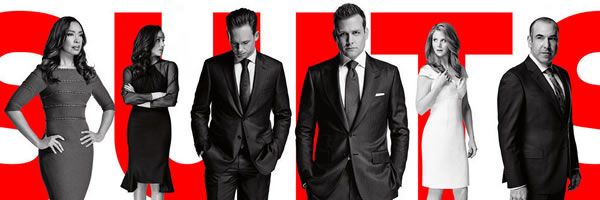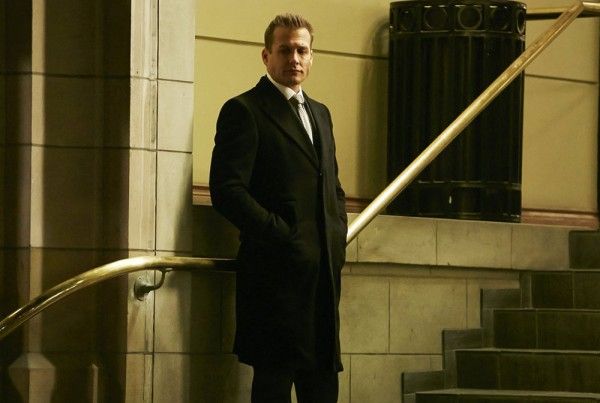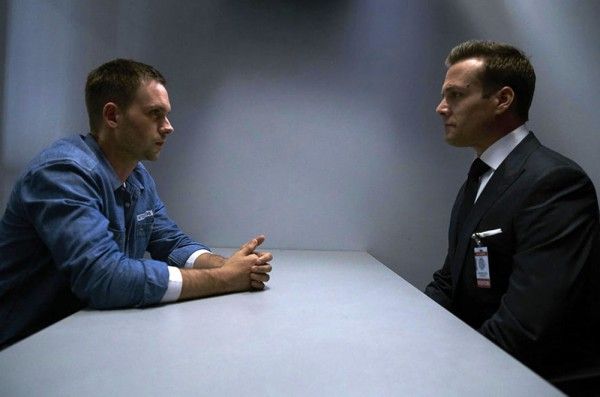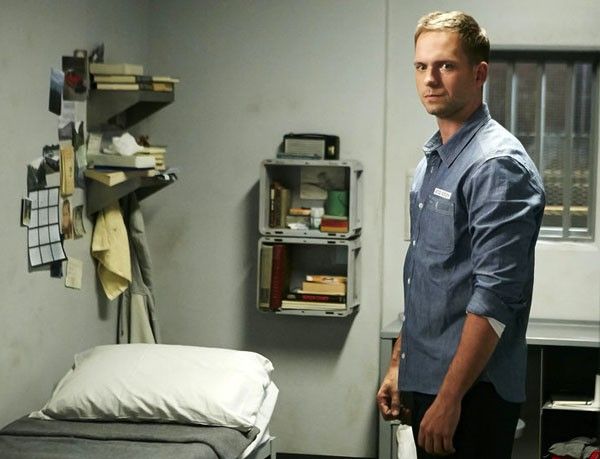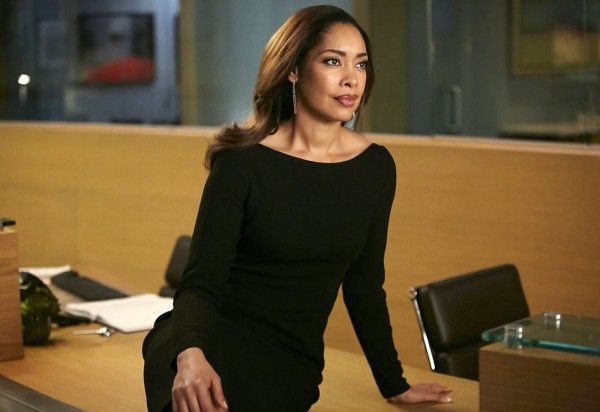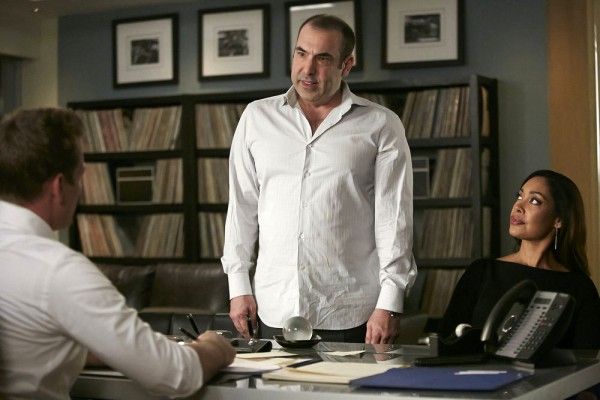Suits is back for Season 6 and dealing with the aftermath of Mike Ross (Patrick J. Adams) being behind bars. Having signed a plea deal to spare his colleagues at Pearson Specter Litt, Mike will be confronted with the harsh realities of prison life, as he starts his two-year sentence, leaving Harvey (Gabriel Macht), Jessica (Gina Torres), Louis (Rick Hoffman), Donna (Sarah Rafferty) and Rachel (Meghan Markle) to pick up the pieces, before they can even begin to rebuild.
During this exclusive phone interview with Collider, show creator Aaron Korsh talked about how far into the future he plans things out, how seven seasons would be the minimum they’ll do with the series, deciding that the truth would come out about Mike Ross, other versions of the outcome, how Mike will have to adapt to his new life, that his own previous career history originally inspired the basis of the show, and what it was like to step onto the set, on his first day as showrunner. Be aware that there are some spoilers.
Collider: I absolutely love this show, and I love how it’s definitely not a multi-tasking show.
AARON KORSH: Thank you! I never really had a formal education in hour-long dramas because I came from comedy and, prior to that, I was just an investment banker. The standard in a lot of network procedurals is to recap what’s going on, at the top of every act or at the end of every commercial break. A lot of times, they’d put in a lot of things to clarify what’s going on for the audience. And I feel like the characters wouldn’t say that to each other because they know what’s going on. They wouldn’t do that. I used to sometimes get the question, “What about the people that watch the show while they’re folding their laundry or doing other things? They won’t be able to follow.” And I said, “Well, you can’t write a show for both audiences – the people that want to totally pay attention and the people who want to half pay attention. If you’re totally paying attention and you write those things, they’re going to wonder why you’re telling them that.” That’s not riveting information.
At this point in the series, you’re on Season 6, which is more than most get to have anymore. How far into the future are you planning things out? Did you just plan out this season, or have you thought about what the next season or even beyond might look like?
KORSH: That is an excellent question. I think it’s just the way that I’m built, but I do not have a crystal ball with this show. I do not have the ability to see very far into the future, ever. I never have. Because the show is so serialized and we’re so often picking up just after we’ve left off and we also do a lot of rewriting, you get to a moment where you planned to do one thing, but when you get there, the thing that you plan to do just doesn’t feel right and doesn’t feel like that’s how the characters would react, even though it seemed like it would be when you broke the story, in the first place. Because of that, it’s just a very, very fluid show. It’s very difficult to plan deep into the future. Most of the time, and I would say most years, we have planned out the beginning of the year through the first 10, not that solidly but fairly solidly, and then the back six are like, “What are we going to do now?” Rarely do I plan the next year, if ever. I’m not sure that I ever have. That’s very short term, unfortunately.
Are you not thinking about how many seasons the show could go, or how many you’d want it to go then?
KORSH: I get asked that question a lot, so it’s not possible to avoid it. I have career and family to think about, so I have to contemplate it sometimes. If a question is posed to me from a storytelling standpoint, like “How much story do you think you have?,” I really don’t know. Every year, I’m petrified we’re not going to come up with something, but every year, fortunately, we have. It’s hard. Doing this show is amazing. It’s a dream come true. I didn’t even have the dream, so it’s beyond a dream come true. But, it’s also consuming. It’s a 24 hours a day, seven days a week, every day of the year endeavor. At some point, there will come a time when either I, individually, or we, collectively – studio, network, cast, writers – think it’s time to go. I’ve always said that I think seven seasons would be the minimum that we would do, and then beyond that, we’ll see.
Do you have your cast under contract through Season 7 then, or would you have to do a bit of negotiating for that?
KORSH: We’re not usually supposed to talk about that, but the cast is under contract through Season 7. I think their original contracts were through Season 6, but some time ago, they extended through Season 7. When they’re starting shows, they have to get the cast under contract for more seasons because, most of the time, the cast is obviously the face of the show. But, writers’ initial contracts are usually much less. I think about it more in terms of creatively. That’s usually what I think about when I think about how long things should go.
You’ve said that you decided that Mike Ross would be found out. When did you decide that would be inevitable and what led you to that decision?
KORSH: I’m not even 100% sure that I remember. I think it was the point where we were like, “You know what? He’s almost getting caught, so let’s just make him get caught. It’s time.” That, of course, petrified me. At the end of Season 1, we had this idea that Trevor was going to go to Jessica and tell her that Mike’s a fraud. I thought it was the greatest ending in the world, and then I was like, “But, what are we going to do in Season 2? This is crazy! Why are we doing this?” One of the writers at the time, Jon Cowan, said to me, “Aaron, you have to have faith that we’ll be able to figure it out.” So, I did. I don’t know how much faith I had, but I took the leap, and it ended up working out pretty well. After that, I thought, if something scares the shit out of me and I think it’s right, we have to do it. We have to keep taking that leap. The only reason not to have him get caught would be that we were afraid we didn’t know what to do after that, and that wasn’t a good enough reason not to do it. It was time, so we did it.
Was there ever a version of the show where Mike got out of having to do jail time?
KORSH: We absolutely discussed that. Usually, when we have these big moments, we try to discuss every possible iteration and permutation, in a short period of time. There were versions where Harvey through down on his sword for Mike, or they got out of it, or they went to verdict and it was not guilty. There were many, many different versions. In the end, we went with our gut, and then we moved forward.
Who is going to be the most upset that they can’t immediately swoop in and fix everything?
KORSH: I think the person that probably gets upset the most, that he can’t swoop in and fix everything, would be Harvey because Mike is the one having the consequences heaped upon him and Harvey is not. If Harvey were in there, I think he would be able to handle this more. His big thing is that he feels like Mike is doing this for him, and he wishes that he was doing it for Mike. I think that’s a struggle that he has, throughout the course of the season.
Mike has been used to being able to talk himself out of everything. With his smarts and his ability to remember everything, he can get himself out of almost any situation or problem, but it seems like that isn’t going to work too well for him in prison. Is he going to have to very quickly find another way to adapt?
KORSH: Yes, obviously, he’s going to have a tough time definitively telling a guy that just has it out for him not to have it out for him. But, he’s a resourceful guy. He’s got his wits about him. He’s got a possible ally in the counselor that we meet in the first episode. Harvey is going to discover what’s going on. He’s going to have the ability to make connections with other inmates in the prison, and he’s got a tactical and strategic mind that’s going to help him. Those are his weapons in this war, or his resources in this conflict, and he’s going to have to use them.
As the showrunner of a TV series, you’re responsible for everyone and everything, and you’re ultimately the one who gets the credit or the blame for the finished product. What do you remember about the first day you were on set as the showrunner? Was there a sense of knowing it’s what you were meant to be doing, or did you feel like you had no idea what you were getting yourself into?
KORSH: That is a great question! Every showrunner has their different path to how they get there. Mine was different than most of the showrunners that I know, in that I came from a different career. I went to business school. I was a finance major. I worked on Wall Street as an investment banker, which is the basis, by the way, of Suits. It was originally written that they were investment bankers on Wall Street. I worked for a guy named Harvey, I had a good memory, and I had a dalliance with marijuana. A lot of the basis for the show is from that. But I found that very unsatisfying, as a career, and ended up leaving. I didn’t know what I wanted to do, and then, ultimately, came to Los Angeles, not to be a writer, but just to live here. I had some friends that were writers, and then I decided that I wanted to try to do it.
I was a writer’s assistant for eight years before I got my first official writing job. During the time that I was a writer’s assistant, I was very frustrated because I wanted to be a writer. I was dejected because I couldn’t seem to break through. But, what I didn’t realize was that I was having an eight-year tutorial in how to be a showrunner. Writers’ assistants oftentimes have a very close relationship with their showrunner because they’re often the ones that are there. They’re there on the notes calls, taking notes. They’re in the room with the writers. They’re next to the showrunner when he’s giving notes on stage. I didn’t realize this, but it’s almost like you have more contact with the showrunner, as a writer’s assistant, than you do as a writer. And then, I had two or three years of staffing.
So, in one sense, I was an incredibly inexperienced showrunner. Most showrunners rise up through the ranks. They’re a writer for 10 to 15 years, and they feel more confident and respectful, and they’ve been leading rooms. I didn’t have that, at all. On the other hand, I’ve had 14 years of experience watching different showrunners and how they behaved and handled situations. I think it was the first day on set, shooting the pilot, and inside I was like, “What am I doing here? I’m a fraud,” which is the basis of Mike being a fraud. Inside, I absolutely felt like that, no doubt about it. On the other hand, when I would see something, I’d be like, “Look, I think it should be this way.” It wasn’t that I knew what I was talking about, better than anyone else. But, what I knew was that it came from me and I have a thought about how it should be done. With little things, it’s very collaborative and we talk about different things. But with the big picture stuff, I was like, “Look, I don’t know if I’m right or not, but if this thing fails and we did what I thought we should do, I can live with myself. But if it fails and I listened to someone else telling me to do something against what my insides were screaming at me to do, I would never forgive myself for that.” That has always been my philosophy. In spite of the fact that I don’t know I’m right, and I absolutely don’t know I’m right, ever, I know what I like and don’t like.
Suits airs on Wednesday nights on the USA Network.

